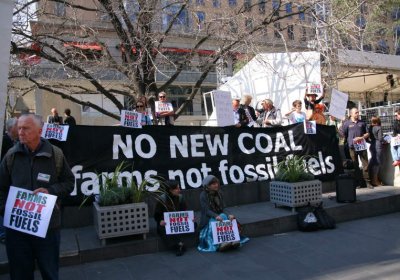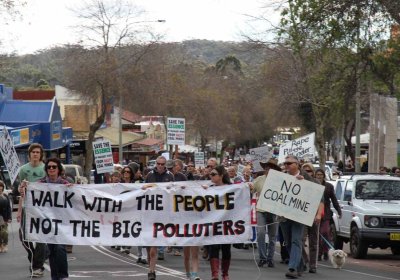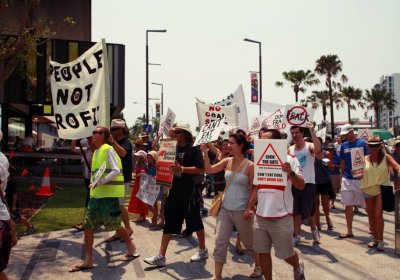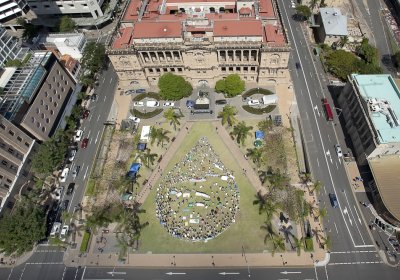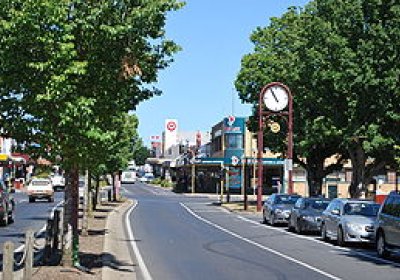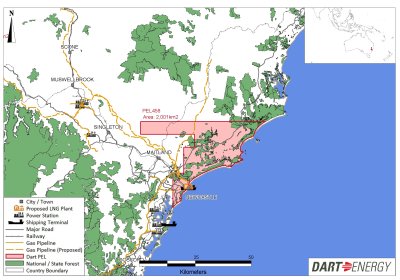A groundswell of support for the campaign against a proposed open cut coalmine is taking place in Victoria’s Bacchus Marsh area and beyond.
This growing support for the No New Coal in Bacchus Marsh campaign was on display at a recent public meeting in the town, where a lawyer from the Environment Defenders Office spoke to a packed hall on the legal implications of mining and what can be done to stop the present exploratory drilling and proposed mine.
Mining
Australia’s south-west is the only part of the country internationally recognised as a biodiversity hotspot. It is also a major agricultural area. The south-west town Margaret River is one of the country’s primary wine producing regions and a major tourist destination.
Organisers were stoked with an exceptional turnout for an anti-coal seam gas (CSG) rally that took place in Townsville on October 16 as part of the coordinated national day of action.
More than 150 protesters marched from Victoria Bridge through town chanting slogans such as “Frack is whack” and “Lock the gate, before it’s too late”.
The rally proceeded to Anzac Park where various speakers addressed the crowd.
Gail Hamilton from the North Queensland Conservation Council said: “The people in Townsville are standing up and saying we don’t want CSG… It is not a safe energy option.”
More than 600 people rallied and marched in Brisbane’s CBD on October 16, as part of a national day of action to “Defend our water from coal and coal seam gas”. The rally in Queens Park was sponsored by the Lock and Gate Alliance and Defend Our Water Queensland.
Lock the Gate Alliance spokesperson Drew Hutton told the rally: “We live in the driest country on earth. To allow the mining industry to pollute our water and destroy our best farming land is a disgrace.
“Why is the Labor government allowing the mining companies to ruin our state? And the Liberal-National Party are no better.”
More than 300 people of all ages gathered in Adelaide on September 24 calling for concentrating solar thermal (CST) technology to replace Port Augusta’s ageing coal fired power stations.
The action was organised by several environment groups, including the Australian Youth Climate Coalition, the Climate Emergency Action Network, the Socialist Alliance, Resistance and the Young Greens. The crowd met in Adelaide’s Rymill Park and took to the streets in a colourful, rhythmic parade, featuring a moving solar thermal tower.
More than 3000 people turned out on October 16 to walk across the Sea Cliff Bridge in the Illawarra in protest against coal seam gas mining plans in the area. The protest was further proof the coal seam gas (CSG) industry is in trouble. Its problem? An informed public.
The Australian said on October 10 that a survey had showed the CSG industry was “losing the PR battle”, with 63% of respondents recalling a negative media story about CSG.
Driving the bad coverage has been the large grassroots campaign against the industry.
Stop CSG Illawarra released the statement below on October 10.
* * *
Stop CSG Illawarra — the community group that organised the 3000-plus person human sign action on Austinmer Beach in late May — is planning a community walk across the iconic Sea Cliff Bridge for October 16.
The walk is part of a national day of coordinated actions under the theme “Defend Our Water”, and is calling for a moratorium on the coal seam gas (CSG) industry, a Royal Commission into CSG and a ban on “fracking”.
The Australian Nuclear Free Alliance released the statement below on October 11.
* * *
In the wake of the approval of BHP-Billiton’s Olympic Dam expansion, the Australian Nuclear Free Alliance (ANFA) is calling for a moratorium on uranium mining due to the long-term impacts associated with the nuclear industry.
Uncle Kevin Buzzacott, Arabunna elder from Lake Eyre and president of ANFA, addressed a rally at parliament House in Adelaide on October 11 held in response to the approvals announced by the state and federal government:
Mining company ECI International has “submitted a surrender request” to the state government for its coal and gas exploration licence covering 500 square kilometers — including the town of Colac and a large region of the Otway Ranges — said the October 7 Colac Herald.
This is the second coal exploration venture in the area that has withdrawn after Mantle Mining pulled out of its project in the Deans Marsh area.
The withdrawal occurs less than two weeks after 100 residents packed a hall at Forrest, in the Otway Ranges, to organise opposition to the project.
Just about every passerby stopped at a recent Green Left Weekly stall in Hamilton, Newcastle, to sign a Lock the Gate Alliance petition for a moratorium on coal seam gas (CSG) mining.
All those who stopped were concerned about plans to mine CSG at nearby Fullerton Cove.
More than 100 locals attended a public meeting in Forrest, in Victoria's Otway ranges on September 16 to show their concern about coal seam gas (CSG) exploration in the area.
Two companies, CFT CBM Holdings and ECI International, have CSG exploration licences over large areas in the Otway Ranges.
More than 60 people assembled outside Blacktown Council on September 24 to protest plans to mine for coal-seam gas in Blacktown. Mining has already begun in the Blacktown area at Eastern Creek and threatens the integrity of the Prospect Reservoir, organisers said.
Ben Hammond from the Blacktown Greens told the rally that Dart Energy was already mining coal-seam gas in Blacktown while AGL was seeking approval to mine also.
- Previous page
- Page 40
- Next page
